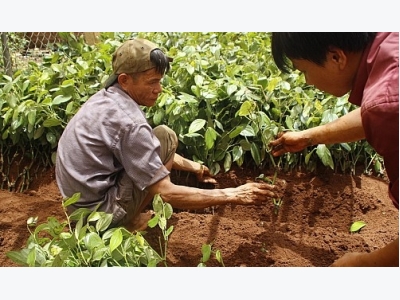Vietnams black pepper race persists notwithstanding price dip

Though per-kilogram prices of black pepper in Vietnam have dropped 65 percent since their record high two years ago, local growers are still racing to increase production.
Farmers at a plantation in Binh Phuoc Province plant black pepper vines for the upcoming season.
After peaking at VND200,000 ($8.81) per kilogram in 2015, the price of black pepper in Vietnam has plummeted to VND70,000-75,000 ($3.08-3.30) amid projections of a further decline in the coming months.
Despite falling prices, black pepper farmers in Binh Phuoc, Gia Lai, and Dak Lak Provinces are still expanding production in the hope that prices will bounce back.
Experts have warned that the unplanned surge in black pepper farming could have grave consequences for the farmers and Vietnam’s competitiveness against foreign producers.
The trade-off
As southern Vietnam began its rainy season at the beginning of June, black pepper farms across the area began their yearly cycle of clearing land for a new crop.
Having traveled over 200 kilometers to buy black pepper vines from the neighboring province of Binh Phuoc, Thao, a grower in Dak Lak, said he planned to ‘play big’ this year by doubling his production.
This is the third year that Thao’s family farm has sacrificed space coffee plants for black pepper.
Over the past three years, Thao said he had removed 1,700 coffee plants from his plantation to grow 2,000 vines of black pepper.
Nguyen Van Tan, a farmer in Binh Phuoc, chose a similar route – destroying his entire rubber plantation in the middle of the harvest season to make way for over 200 black pepper vines.
According to Tan, the price of rubber has stalled for many years, leaving local farmers with a negative outlook on the industry.
Leading your correspondent through his newly planted black pepper vines, Tan said it cost him nearly VND200,000 ($8.81) to build each steel support beam for his black pepper vines.
For Tan, it was a huge investment, but seeing other farmers taking the same steps helped him to feel validated in his decision.
“We have yet to make a penny from black pepper, but I’m not getting cold feet,” Tan said self-assuredly. “The price is going to bounce back. That’s how it is for agricultural produce.”
“We had to wait for two years to harvest the first batch of black pepper and sell it for VND70,000-80,000 [$3.08-3.52] per kilogram,” said Nguyen Thanh Ba, a farm owner in Binh Duong. “We still make VND40,000-45,000 [$1.76-1.98] in profit for every kilogram, twice as much as coffee and it’s far less effort than growing cashews.”
Oversupply
According to Nguyen Mai Oanh, deputy chairwoman of the Vietnam Pepper Association, Vietnam’s black pepper plantations currently cover a combined 130,000 hectares and yield roughly 180,000 metric tons of products.
Though the number is already 30,000 tons higher than last year, Oanh says that number is still rising.
“The number of new plantations saw a significant increase between 2010 and 2014, when the price of black pepper rocketed to VND150,000-200,000 [$6.61-8.81] per kilogram,” Oanh explained. “This is likely to result in even higher black pepper yields in the coming years.”
According to the chairwoman, Vietnam’s production of black pepper currently accounts for nearly 60 percent of global production, however this surge in the plant’s production will most likely lead to oversupply, thereby lowering prices and creating instability in the market.
K., a representative for a black pepper exporter based in Binh Duong, said there are 10,000 tons of black pepper in Vietnam still unsold from last year’s crop.
That, combined with this year’s surplus and any imported pepper, means the domestic market might wind up with an oversupply of 40,000 tons of black pepper, K. said.
Other major black pepper exporters such as Cambodia, India, and Brazil, are also expanding production, further complicating the picture, according to a representative from Ho Chi Minh City-based Thuc Sinh Company.
“The global production of black pepper this year is forecast at around 470,000-480,000 tons, 80,000 tons higher than last year,” he predicted.
Losing the competitive edge
According to a local exporter, despite reaching close to 60 percent of global production, Vietnam’s lack pepper is gradually losing the market to rising competitors due to the country’s failure to crack down on ‘dirty’ pepper.
This trend is even more alarming considering the fact that Vietnam’s pepper has the competitive edge of being cheaply priced, up to $100 lower per ton than black pepper originating from Brazil.
One CEO of a Vietnamese black pepper exporter disclosed that his company spent VND20 billion ($881,000) last year running quality control on their products to ensure they met European Union standards.
“We exported 4,000 tons of black pepper to the EU last year, only half of which was locally sourced. The rest had to be imported from Brazil and Indonesia since it was difficult to find clean sources of black pepper domestically,” the CEO said.
Related news
 US halts Brazil beef imports, citing food safety concerns
US halts Brazil beef imports, citing food safety concerns The United States announced Thursday a halt to all imports of fresh beef from Brazil, the world's second-largest producer, citing recurring food safety concerns
 Organic Ant Control for Citrus Trees – Tanglefoot Sticky Barriers
Organic Ant Control for Citrus Trees – Tanglefoot Sticky Barriers This article demonstrates organic ant control for citrus trees using tree tanglefoot, a natural ant repellent for fruit trees.
 Vietnam launches new agency to 'rescue' farm products
Vietnam launches new agency to 'rescue' farm products Vietnam’s Ministry of Agriculture and Rural Development (MARD) launched a new department on Wednesday aiming to “rescue” the country's farm products.